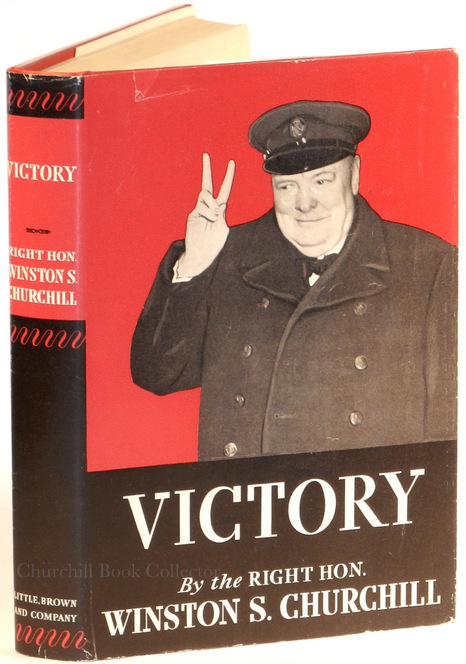By Winston S. Churchill
First published in 1946 by Cassell and Company Ltd., London
"...The bomb brought peace, but men alone can keep that peace,
(Speech as Leader of the Opposition in the House of Commons, 16 August 1945)
and henceforward they will keep it under penalties which threaten the survival,
not only of civilization but of humanity itself.."

Having done so much to win the war, Churchill faced frustration of his postwar plans when his wartime government fell to Labour in the General Election of July 1945. His final speech in this volume - a review of the war delivered on 16 August 1945 to the House of Commons - is delivered as Leader of the Opposition rather than as Prime Minister.
This first major speech as Leader of the Opposition is in some ways difficult to read. Now from the diminished position of Opposition, Churchill rings with a myriad of carefully phrased cautions and concerns, as he seeks to guide the domestic policies of a shattered postwar Britain and constructively influence the ominous shape of the postwar world while ensuring Britain's place within it. Perhaps most concerning to Churchill was the swift and alarming curtailing of freedom throughout postwar Europe - freedom that the war had ostensibly been fought to preserve.
"Just as in the baleful glare of 1940, so now, when calmer lights shine, let us be united upon these resurgent principles and impulses of the good and generous hearts of men. Thus to all the material strength we possess and the honoured position we have acquired, we shall add those moral forces which glorify mankind and make even the weakest equals of the strong." As beautiful as these words remain, they sound more like a plea from the sidelines than a clarion call from a position of strength. Perhaps predictably, this was a plea that went substantially unheeded as former allies - both within Britain and among the victorious nations - scrambled for interest and primacy.
During his long public life, Winston Churchill played many roles worthy of note - Member of Parliament for more than half a century, soldier and war correspondent, author of scores of books, ardent social reformer, combative cold warrior, painter, Nobel Prize winner. But Churchill's preeminence as a historical figure owes most to his indispensable leadership during the Second World War, when his soaring and defiant oratory sustained his countrymen and inspired the free world. Of Churchill, Edward R. Murrow said, "He mobilized the English language and sent it into battle." 
For this sixth volume, Charles Eade, Editor of the Sunday Dispatch, continued to compile Churchill's war speech volumes free of charge - a service he first volunteered in 1941 when Churchill's son and previous compiler, Randolph, was called into wartime service.
The first edition of Victory is bound in coarse, blue cloth. The dust jacket is colored a deep turquoise on the upper half transitioning into a light purple on the lower half, with print in white and black. There was only a single, June 1946 printing of the British first edition. However, it should be noted that there were two states of this printing, the first 

The U.S. first edition is bound in red cloth stamped in gilt with black title panels on the spine and front cover. The illustrated dust jacket is printed red, black, and white with a photo of Churchill from the waist up wearing a navy pea coat and naval cap and giving the "V for victory" sign with his right hand. There was just a single printing of the U.S. first edition, published in August 1946.
As with the British editions, there were eventually seven individual U.S. volumes of Churchill's war speeches published between 1941 and 1946. However, unlike their British counterparts the U.S. editions vary considerably in publisher, size, and appearance. The first volume, with a U.S. title of Blood, Sweat, and Tears, was published by G.P. Putnam's Sons, in a binding style matching Putnam's publications of Great Contemporaries (1937), While England Slept (1938), and Step By Step (1939) but with a distinctively unique dust jacket. Volumes 2-6 were published by Little, Brown and Company. Each of these five volumes was bound in red cloth with a black and red illustrated dust jacket, but the volumes differ considerably in height with volumes 4-6 smaller. Wartime material rationing is cited as the reason for this shrinking on the Volume 5 dust jacket flap. The final volume was published by Simon and Schuster in an entirely different size, binding, and dust jacket style.
A Canadian edition was bound and jacketed as the U.S. edition with the Canadian publisher's name (McClelland and Stewart) substituted for that of the U.S. publisher. All seven Canadian war speech volumes were published by McClelland and Stewart, with only the first and final volume dust jackets differing appreciably from their U.S. counterparts.
Rounding out the English language first editions of Victory was an Australian first edition published by Cassell, Melbourne, in 1947. While there were ultimately seven British, U.S., and Canadian first editions of Churchill's war speeches, there were only six Australian editions, there being no Australian edition of the first volume, Into Battle. The bindings of the Australian edition war volumes vary considerably within and between each edition. The dust jackets roughly echo the style of the British first editions, though with significant differences, particularly to the first (The Unrelenting Struggle) and final (Secret Session Speeches) volumes.
© 2014 Churchill Book Collector. All rights reserved.
